The 1886 Dutch Reformed Church split, also known as the Doleantie (from Latin dolere, 'to feel sorrow'), was the name of a prominent schism in the Dutch Reformed Church (Nederlands Hervormde Kerk) that took place in 1886 and was led by a renowned minister, Abraham Kuyper. [1] The Doleantie was not the first schism in the Dutch Reformed Church. Another schism, the Secession of 1834 (Afscheiding van 1834), had led to the formation of the Christian Reformed Church in the Netherlands (Dutch : Christelijke Gereformeerde Kerk in Nederland).
In 1885, the first moves towards schism were made when Kuyper and his supporters issued a formal complaint about liberalising practices in the Dutch Reformed Church. Their complaint never won broad support within the church, and in the winter of 1885-1886, the call for schism grew stronger amongst a large number of conservative congregations, most of which were located in the Veluwe area and elsewhere in what is now called the Dutch Bible Belt.
The first congregation to secede was Kootwijk, which on 7 February 1886 appointed a minister who had been trained at the Free University of Amsterdam without waiting for permission of its classis. The following, day the congregation in Voorthuizen followed suit.
The seceded congregations united in the Low German Reformed Church (Dolerende) (Dutch : Nederduits Gereformeerde Kerk (Dolerende)). Nederduits Gereformeerde Kerk had been the official name of the Dutch Reformed Church until 1816. With that name, the seceded churches wanted to show that they thought of themselves as the legitimate continuation of that church, which had been highly prominent in the Dutch Republic. The suffix (Dolerende), meaning 'those who feel sorrow', was added to show their disapproval with the Dutch Reformed Church.
Later in 1886, Kuyper and his supporters occupied the New Church in Amsterdam, the seat of the governing body of the Reformed Church, to force a settlement in the conflict over church property that had followed the Doleantie. In July 1886, the dolerenden had to accept a verdict against them.
In 1892, the Nederduits Gereformeerde Kerken (Dolerende) merged with the Christian Reformed Church in the Netherlands to form the Reformed Churches in the Netherlands.
The Protestant Church in the Netherlands is the largest Protestant denomination in the Netherlands, being both Calvinist and Lutheran.

Afrikaner Calvinism is a cultural and religious development among Afrikaners that combined elements of seventeenth-century Calvinist doctrine with a "chosen people" ideology based in the Bible. It had origins in ideas espoused in the Old Testament of the Jews as the chosen people.
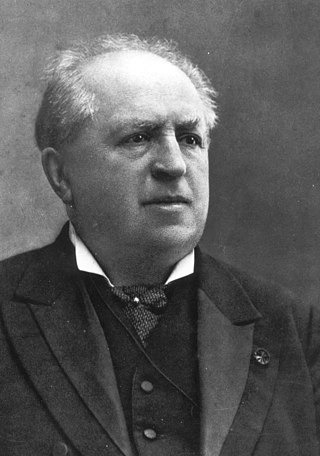
Abraham Kuyper was the Prime Minister of the Netherlands between 1901 and 1905, an influential neo-Calvinist pastor and a journalist. He established the Reformed Churches in the Netherlands, which upon its foundation became the second largest Reformed denomination in the country behind the state-supported Dutch Reformed Church.

The Christian Reformed Church in North America is a Protestant Calvinist Christian denomination in the United States and Canada. Having roots in the Dutch Reformed Church of the Netherlands, the Christian Reformed Church was founded by Dutch immigrants in 1857 and is theologically Calvinist.
The Dutch Reformed Church was the largest Christian denomination in the Netherlands from the onset of the Protestant Reformation in the 16th century until 1930. It was the traditional denomination of the Dutch royal family and the foremost Protestant denomination until 2004, the year it helped found and merged into the Protestant Church in the Netherlands. It was the larger of the two major Reformed denominations, after the Reformed Churches in the Netherlands was founded in 1892. It spread to the United States, South Africa, Indonesia, Sri Lanka, Brazil, and various other world regions through Dutch colonization. Allegiance to the Dutch Reformed Church was a common feature among Dutch immigrant communities around the world and became a crucial part of Afrikaner nationalism in South Africa.
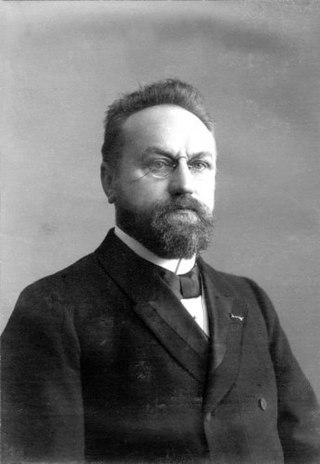
Herman Bavinck was a Dutch Calvinist theologian and churchman. He was a significant scholar in the Calvinist tradition, alongside Abraham Kuyper, B. B. Warfield, and Geerhardus Vos.

The Reformed Churches in the Netherlands was the second largest Protestant church in the Netherlands and one of the two major Calvinist denominations along with the Dutch Reformed Church since 1892 until being merged into the Protestant Church in the Netherlands (PKN) in 2004. The PKN is the continuation of the Dutch Reformed Church, the Reformed Churches in the Netherlands and the Evangelical Lutheran Church in the Kingdom of the Netherlands.
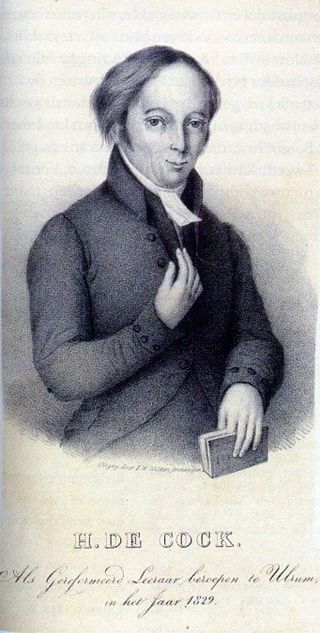
Hendrik de Cock was a Dutch minister responsible for the 1834–35 Dutch Reformed Church split due to his incarceration and suspension from office for his Calvinist convictions.
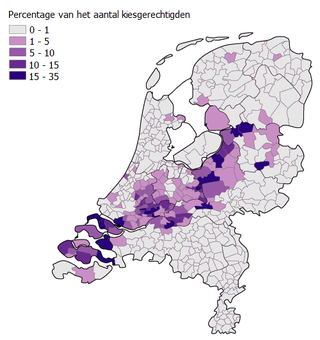
The Bible Belt is a strip of land in the Netherlands with the highest concentration of conservative orthodox Reformed Protestants in the country. Although the term is of recent origin the Dutch Bible Belt has existed for many generations.
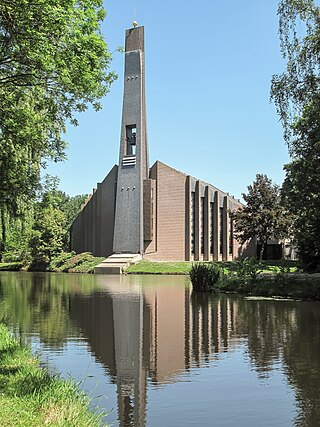
The Christian Reformed Churches in the Netherlands is a Protestant church in the Netherlands.

The Hervormd Gereformeerde Staatspartij was an orthodox Protestant political party in the Netherlands during the interwar period. For its orthodox political ideals and its refusal to cooperate in any cabinet, the party is called a testimonial party.
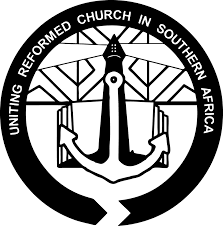
The Uniting Reformed Church in Southern Africa was formed by the union of the black and coloured Nederduits Gereformeerde Kerk mission churches.

The Reformed Churches in the Netherlands (Liberated) (Dutch: Gereformeerde Kerken in Nederland (vrijgemaakt)) was an orthodox Calvinist federation of churches. This church body arose in 1944 out of the so-called Liberation (Vrijmaking) from the Reformed Churches in the Netherlands, when many pastors and members refused to go along with the General Synod's demand to hold to "presumed regeneration of infants" at their baptism. Klaas Schilder played an important role in the Liberation. There are currently 270 affiliated local congregations with a total of about 120,000 members in 2016.
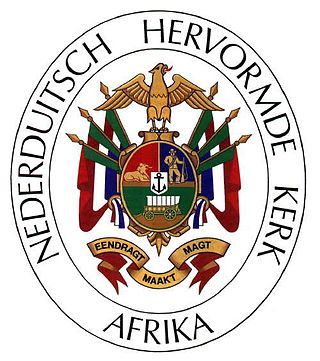
The Dutch Reformed Church in Africa is a Reformed Christian denomination based in South Africa. It also has congregations in Namibia, Botswana, Zambia and Zimbabwe. Along with the Dutch Reformed Church in South Africa (NGK) and the Reformed Churches in South Africa, the NHKA is one of the three Dutch Reformed sister churches of South Africa. The NHKA retains the old Nomenclature Nederduitsch, the word originally referring to the Dutch language. The word refers to the Low Saxon language today. The Dutch language remained the official language of the church until 1933 when the church started functioning almost exclusively in Afrikaans.
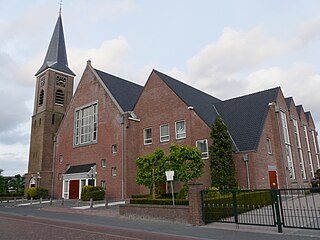
The Restored Reformed Church is a Calvinist denomination in the Netherlands. It was founded in 2004, from congregations which made up the orthodox-reformed wing of the Dutch Reformed Church; they had previously been part of groups named Het Gekrookte Riet and the still existing Gereformeerde Bond within the Dutch Reformed Church. The Church has grown steadily since its founding.
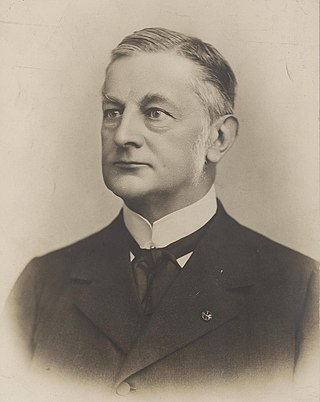
Jhr. Alexander Frederik de Savornin Lohman was a Dutch politician and leader of the Christian Historical Union during the first quarter of the 20th century.

The Reformed Congregations is a conservative Reformed church with 152 congregations in the Netherlands, 1 in Randburg, South Africa and 1 congregation in Carterton, New Zealand. The denomination has approximately 107,299 members as of 1 January 2015. It is Calvinist in theology. It is affiliated with the North American Netherlands Reformed Congregations.
The Reformed Association in the Protestant Church in the Netherlands is a confessional orthodox Calvinist group and movement within the Protestant Church in the Netherlands.
The Turffontein Reformed Church was a congregation of the Dutch Reformed Church in South Africa (NGK) in southern Johannesburg, Transvaal. It was founded in 1906 and for years had a large membership, at times exceeding 3,000.

The Dutch Reformed Churches is a Reformed Christian denomination, formed on May 1, 2023 as a merger of the Reformed Churches in the Netherlands (Liberated) and Netherlands Reformed Churches.